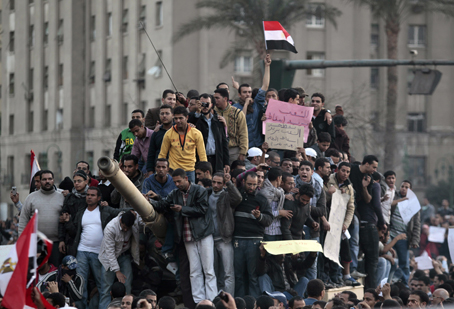 So unless you’re living under a rock, you know that there’s a revolution going on in Egypt right now.
So unless you’re living under a rock, you know that there’s a revolution going on in Egypt right now.
Protesters have been demonstrating 24 hours in Tahrir square in Cairo for the past seven days, demanding that President Mubarak step down from power. With police unable to contain the protests, the army has been called out, but seems to be taking a neutral role.
It’s hard to tell exactly what’s going on right now, but from what I can see, it doesn’t seem likely that Mubarak can hold onto power much longer. In some places, it seems that the military has actually sided with the protesters, allowing them to stand on top of tanks and blocking the police with their armored vehicles. Many of the looters include police officers, who apparently have read the writing on the wall.
If Mubarak does step down, the effects will be incredible. Egypt is by far the most populous Arab country, and a major center for regional cultural trends. Mubarak’s regime has also been one of the most authoritarian and repressive, and until now, his hold on power seemed as absolute as any Arab ruler. If he falls, where will the next revolution happen? Libya? Syria? Yemen? Sudan? Iran?
This wave of protests didn’t start in Egypt; it started in Tunisia, where a citizen’s self-immolation sparked massive unrest. When the protests reached their apex, the military and police stepped down, forcing President Ben Ali to flee the country. Tunisia had one of the most repressive regimes in the region, and the speed with which it collapsed was absolutely stunning–and no doubt an inspiration to the people of Egypt.
Some articles I’ve read suggest that the Iraq War and the fall of Saddam Hussein was a major cause of the current revolution, but I disagree. Most of the Arabs I’ve talked to consider the US invasion of Iraq to be a disaster, and have nothing positive to say about anything that’s come of it. The fate of Iraq is still very much in the air, and many people (myself included) don’t expect democracy to take root in that country without another dictator coming to power.
Instead, I think the root cause of this revolution is economic. According to the UN, food prices across the world have risen 25%, and the global recession has led to widespread unemployment. No doubt the people of Egypt have been feeling this, especially with the huge disparity between the rich and the poor. What we’re seeing right now is a loosely organized, broad-based popular uprising, with people from all segments of society demanding that Mubarak step down.
I’ve got to be honest; I think these protests are very exciting. The chaos and violence is definitely bad, but if it leads to a more just and democratic Egypt, I think that it’s definitely a good thing. When I visited Egypt back in 2008, my first impression of Cairo was that the place was a post-apocalyptic wasteland of a city, with trash in the streets and police armed with machine guns. The longer I stayed, the more I felt that the country was backward–and that a major source of the backwardness was the corrupt Mubarak regime.
I’m not an Egyptian, so I can’t say what’s best for the Egyptian people, but I hope and pray that they get what they are fighting for–a more just and democratic country.